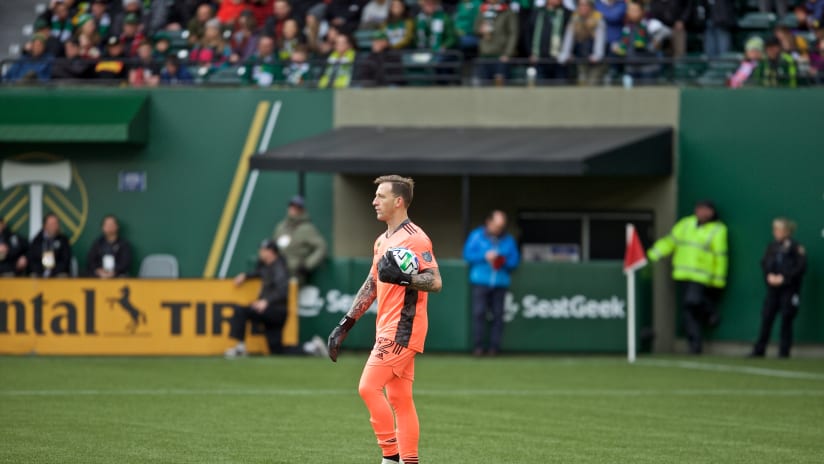On the day Major League Soccer and its players association confirmed a new labor peace – and the league’s commissioner, via a mid-day video call, confirmed teams could return to competitive games soon – Portland Timbers goalkeeper Steve Clark boiled his thoughts down to a few basics – basics which hint at an athlete’s view:
“I’m a soccer player,” he explained, attending a Wednesday conference call of his own. “I play goalkeeper. That’s what I do. That’s what I love to do. That’s essential to my being. And I’m really excited to be out there, playing.”
Clark’s reaction comes on the heels of a new, five-year collective bargaining agreement being confirmed by the league and its players association, the beginning of which clears the way for what commissioner Don Garber called “the Orlando project.” Though he declined to give details on the upcoming competition, Garber conceded that a summer tournament can now take place. Dates, times and format are still to come.
“That’s the big story, here,” Clark said, alluding to the tournament. “Both sides [were] advocating for themselves,” during collective bargaining, “but there’s a bigger picture here … As a players association, I thought that we were firm, united, but [we] did our best to get back on the field …”
Again, Clark alluded to player identity as a driving factor in the deal.
“This is what we do,” he said. “This is a big part of my life and who I am. I have been doing this since I was eight years old, and I’m a 12-year pro. It was nice to have a break, but it’s time.”
That time comes amid three major challenges for MLS and, more importantly on two counts, the broader world. The first of those challenges was addressed with the new labor peace, with the reportedly contentious negotiations between players and owners ending a deal that will run through the 2025 season.
“Negotiations, whether they’re about a house or they’re as big as a labor negotiation, are always tense,” Clark confirmed. “But overall, you had two sides that wanted to play soccer.”
The second challenge is the ongoing global pandemic, with safety measures in place for the novel coronavirus making playing in front of crowds impossible.
“That’s going to be different without fans,” Clark admitted, “But I’m a competitor. You could put me in a ping pong match and I’m not going to forget if I lost to you for years.
“There is not going to be any problem. The product is going to be good on the field. We’re going to want to win.”
The third challenge has become the country’s dominant story over the last week, with protests attempting to address racial injustice taking place across the United States, including in the streets of Portland. Timbers forward Jeremy Ebobisse shared his feelings on the issues via a Monday Medium post, prompting questions of Clark about how teammates are showing support.
“First and foremost, myself and as a human being – my family, my wife and I – we have taken it upon ourselves not only now but in years’ past: advocacy,” he said. “My wife worked on a community action group in Columbus to end mass incarceration from 2015 and 2016. That was something I’ve done.
“But primarily with Jeremy, I’ve been so grateful to have the opportunity to ask him, ‘What is your life experience?’ And I think that’s been so important for me to do so, saying ‘hey, I don’t know what it’s like to be an African-American in the United States. I can do my best, but I want to ask you what’s been your experience.’ He’s been [gracious] enough to share that, and I believe that that relationship I’ve had with him, and him being in a safe place to talk about race, is a really beautiful thing.”
Clark, 34, went on to explain that his approach to the discussion around race is shared by others within the Timbers’ squad.
“There are a lot of guys on this team who want to have these conversations,” he said. “And let me just say, these conversations aren't difficult. It’s just difficult to say, ‘Hey, Jeremy. I don’t know what I'm talking about. Please help me.’
“That humility is very important. In our country now, you’re having a lot more of these conversations, and that’s a positive thing ... That’s what we’ve been doing. I hope to encourage other players to do that as well.”
Discussions around race in the United States will likely continue into the foreseeable future. In the short term, though, those discussions will take place alongside something less important: Portland’s preparations for Orlando, as well as a ramp up of the Timbers’ training activities, should progress continue.
One thing that won’t persist, at least until closer to 2025? The league’s labor issues. As of Wednesday, the sides were starting to move on.
“I know [the negotiations are] interesting,” Clark said. “I get that. ‘How does it work?’ For me, it’s more about moving forward. Both sides are advocating for themselves. That’s business. The main thing is that we’re ready to play.”












